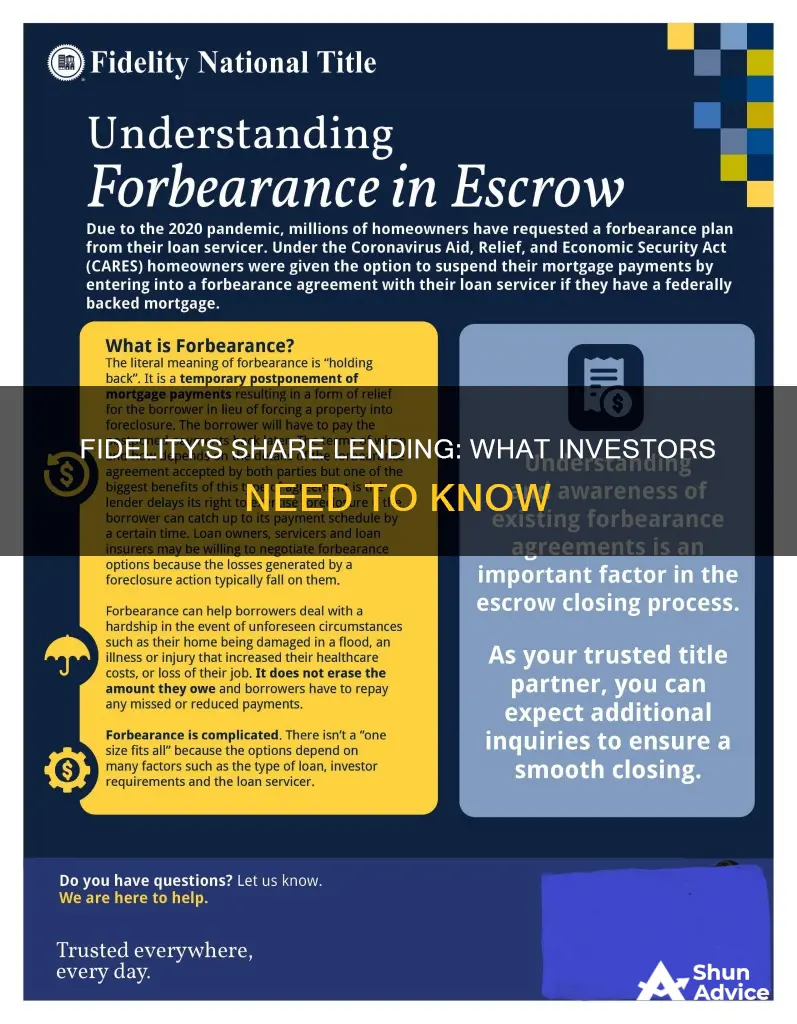
If you're a Fidelity customer, you may be wondering if the company loans out your shares. The answer is yes, but only if you have a margin account or have enabled Level 3 and 4 options trading permissions. This is a common practice for investment brokers, and Fidelity makes money from lending your shares to short sellers. While there are no direct benefits to you as a customer, you maintain full economic ownership of the securities on loan and can sell or recall them at any time. You can opt out of these programs at any time by moving to a cash account, but this may downgrade your options trading permissions.
| Characteristics | Values |
|---|---|
| Does Fidelity lend shares? | Yes, Fidelity lends shares to short sellers. |
| When does Fidelity lend shares? | When you have a margin account or have enabled Level 3 and 4 options trading permissions. |
| Can I opt out? | Yes, you can opt out by moving to a cash account. |
| What are the benefits of letting Fidelity lend my shares? | You can earn income through interest rates and dividends. |
| What are the risks? | You lose your voting rights and are not covered by SIPC insurance. |
| What is the minimum amount required to enrol in the Fully Paid Lending Program? | $25,000 in each Fidelity brokerage account. |
What You'll Learn

Fidelity's Fully Paid Lending Program
The income for lending securities will be credited to the client's Fidelity account monthly, with interest accruing daily. Lending interest rates are variable and may change at any time based on market conditions, particularly short-selling demand and available lending supply. While clients can view securities on loan, lending interest rates, and program activity on their Fidelity Positions page, they do not have voting rights on loaned shares. However, they can recall the loan in advance of the record date if they wish to vote.
It is important to note that shares on loan are not covered under the Securities Investor Protection Corporation (SIPC). In the event of a counterparty default, Fidelity provides collateral at a minimum of 100% of the loan value, held at a third-party custodian bank independent of Fidelity. While there is no negative impact if the underlying stock rises, the only downside risk is the counterparty risk if Fidelity defaults.
Overall, Fidelity's Fully Paid Lending Program offers a way for eligible clients to generate incremental income by lending their securities. However, it is essential to carefully consider the risks and implications, such as the loss of voting rights and the lack of SIPC coverage, before enrolling in the program.
Extended Warranty Coverage: Loaner Vehicles Included?
You may want to see also

How lending affects ownership
Share lending is a common practice among brokerage firms, where they lend out shares of stocks held by their clients to other market participants, such as short sellers. While this practice can generate additional revenue for the brokerage firm and enhance market liquidity, it also exposes investors to certain risks and drawbacks.
One of the primary risks associated with share lending is counterparty risk, which arises if the borrower of the shares defaults or fails to return them, potentially resulting in losses for the investor. Additionally, share lending can lead to a dilution of the investor's ownership stake and potential price volatility. Therefore, it is crucial for investors to understand the implications of share lending and make informed decisions to protect their investments.
When you lend your shares through Fidelity's Fully Paid Lending Program, you maintain full economic ownership of the securities on loan. This means that you can sell or recall the loans at any time. However, one important consideration is that you relinquish your ability to exercise voting rights on the loaned shares if they are on loan over a proxy record date. This means that while you still have ownership of the shares, your ability to influence certain decisions or vote on resolutions related to the shares may be impacted.
It is worth noting that Fidelity requires participants in its lending program to have a certain asset level. Specifically, Fidelity mandates a minimum of $25,000 in the account that an individual wishes to enrol in the program. This requirement is in place to ensure that individuals have a substantial financial foundation before engaging in share lending.
Fannie Mae Loans: Do You Need a Cash Cushion?
You may want to see also

Compensation for loaned securities
Fidelity may receive compensation in connection with the use of loaned securities, including lending the securities to other parties or facilitating the settlement of short sales. When a security is loaned, the title and ownership are transferred to the borrower, who must put up collateral, such as cash, other securities, or a letter of credit. A brokerage charges a client a loan fee, or borrow fee, for borrowing securities, along with any interest due related to the loan. The loan fee and interest are charged according to a Securities Lending Agreement that must be completed before a client borrows the stock.
Fidelity's compensation for the applicable loan will be the fees paid by the third-party borrower less the lending fee paid to the customer. The Lending Interest Rate is based on several factors, including borrowing demand, the overall lendable supply of the security, short-selling and hedging interest, and general market conditions, and is therefore subject to change. Generally, the Lending Interest Rate for each loan will be 60% of a third-party benchmark lending rate calculated daily for each security.
Fidelity's Fully-Paid Lending Program allows customers to lend certain fully-paid or excess margin securities. In return, customers receive collateral in the form of cash and/or securities held at a custodial bank independent of Fidelity. They also receive an interest rate-based lending fee calculated by multiplying the current Lending Interest Rate by the contract value of the securities on loan.
Under the terms of the Master Securities Lending Agreement (MSLA), customers maintain economic ownership of the securities on loan and may recall the loan at any time. They may also sell securities on loan at any time online or through a representative. However, customers relinquish their ability to exercise voting rights for securities on loan. If they wish to act on an upcoming proxy vote, they must contact Fidelity with instructions to return the securities before the record date of the proxy vote.
Fannie Mae's Stance on PACE Loans
You may want to see also

Risks of fully paid lending
Fully paid lending, also known as securities lending, is when you allow another party, typically a financial institution, to borrow stocks that you already own. In return, you get paid a fee. This is like "renting" out your stocks. Institutions typically borrow stocks for trading activities like settlements, short selling, and hedging risks. While you are allowing others to borrow your stocks, you still retain ownership and can sell them anytime.
- Tax implications: While you are lending your stock, you will no longer receive a dividend payout. Instead, you will receive a cash payment, which could be taxed at your regular income tax rate.
- Market fluctuation: The value of the securities you lend may fluctuate during the loan period. This is especially true for securities that are not widely held or actively traded, as they may be more vulnerable to market manipulation and short-selling practices that could drive down their value.
- Counterparty default: There is a risk that the borrowing party may default on their obligations under the loan agreement. In such cases, you may need to rely on collateral or other remedies provided for in the loan agreement.
- Voting rights: When you lend your securities, you may lose your proxy voting rights on those shares. This could be an issue if there is a significant transaction or proxy battle that you would have otherwise voted on.
- Conflict of interest: The portfolio manager or dealer may have a conflict of interest when borrowing and lending out securities. They may generate profits by borrowing client securities to cover short selling in their own proprietary trading accounts.
- Complexities: Fully paid lending can be a complex process with many nuances. It may not be suitable for everyone, and it is important to understand the risks and complexities before participating.
Farm Bureau Loans: What You Need to Know
You may want to see also

Opting out of the lending program
If you have a Fidelity account, you can opt out of the share lending program. This is a program where Fidelity lends your shares to short sellers, charging them interest as long as their short position is open. This makes money for Fidelity, but there are no benefits to you as a customer.
To opt out of the share lending program, log in to your Fidelity account and navigate to the 'Accounts & Trade' tab. From the drop-down menu, select the 'Margin and Options' section. Then, under the ''Account Features' option, look for the ''Securities Lending' section. Here, you can manage your share lending preferences. Click on the 'Securities Lending' link to access the settings and disable share lending. You can do this by toggling the switch or selecting 'disable'. Make sure to save your changes before exiting the menu.
It is important to note that opting out of the share lending program may downgrade your options trading permissions. Additionally, share lending can bring some benefits, such as receiving incremental income on securities and receiving dividends on stocks that you lend.
Fannie Mae: Insuring Loans and Managing Risk
You may want to see also
Frequently asked questions
Yes, Fidelity does loan shares. The company has a securities lending division and a new platform that enables it to compete with other large financial institutions.
Fidelity loans your shares when you have a margin account or have enabled Level 3 and 4 options trading permissions.
Yes, you can opt out by moving to a cash account. You can also ask to be removed from the shared lending program.
Lending your shares can produce passive income. You maintain full economic ownership of the securities on loan and may sell or recall loans at any time. You will also receive income from lending your shares in addition to the premium for selling the call.







